Everything You Need to Know About Traditional Chinese Musical Instruments 🎻 + BONUS Flashcards
Seen some interesting-looking musical instruments on your China and Taiwan travels and wondered what they’re called and how they’re played?
Look no further.
While there are hundreds of different types of traditional Chinese musical instruments, some you will see around and about more than others.
So we’re going to go through 5 Chinese musical instruments that we think you should all know, as they’re probably the most common ones you’ll see or hear about.
Chinese Musical Instruments || Erhu
Chinese Musical Instruments || Guzheng
Chinese Musical Instruments || Guqin
Chinese Musical Instruments || Dizi
Chinese Musical Instruments || Pipa
Chinese Musical Instruments || Instruments in Chinese
BONUS || Quiz
Chinese Musical Instruments || FAQs
Want to learn the names of instruments in Chinese? We’ve made a helpful video for that!
Chinese Musical Instruments || Er Hu 二胡
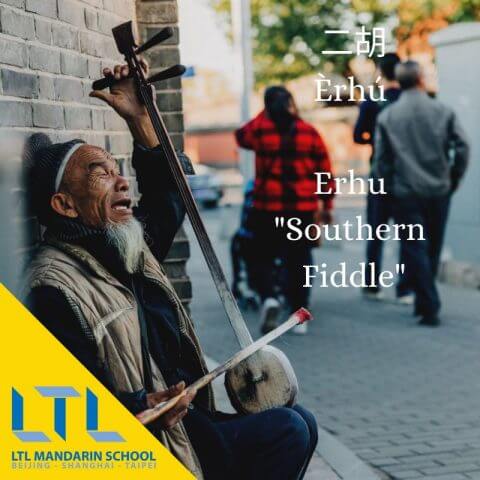
You will probably see the “erhu” around on your China travels.
You’ll often find amateurs and street musicians practising in public spaces, subways stations and on the streets.
The Erhu is sometimes translated as a “Southern Fiddle” in English – it’s a kind of Chinese-style violin with 2 strings, dating back to Tang Dynasty times (7th to 10th centuries).
Compared to other traditional Chinese instruments it’s relatively inexpensive.
Traditionally it was used in opera and orchestral performances, but today it is also a popular solo instrument.
- Erhu in Chinese Characters: 二胡
- Pinyin: èrhú
- English Name: “Southern Fiddle”
Chinese Musical Instruments || Guzheng 古筝
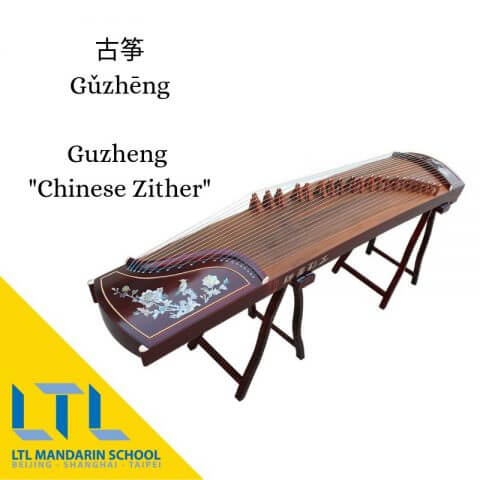
Said to be an ancestor of the Japanese Koto, early forms of the Guzheng date back to the Warring States period of Chinese history (more than 2,500 years ago).
It remained popular both in the Imperial court and among common people throughout Qing dynasty times and is still played in China today.
The Guzheng is often played at opera and concert performances in China, usually solo.
- Guzheng in Chinese Characters: 古筝
- Pinyin: Gǔzhēng
- English Name: “Chinese Zither”
Chinese Musical Instruments || Guqin 古琴
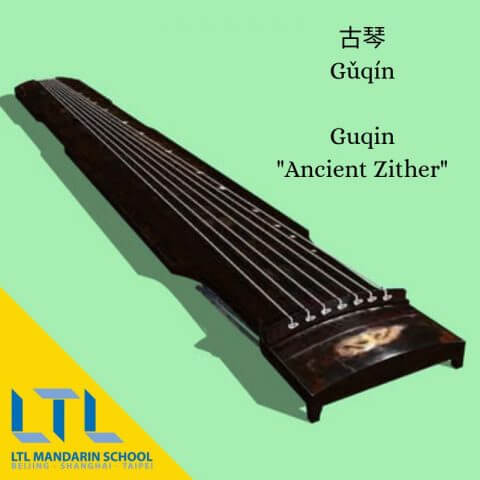
The Guqin is said to date back 3000 years, making it the oldest instrument on our list.
It is often considered “The Father of Chinese Music”, which is why it made the list.
The Guqin was very popular among scholars, but never really became accessible to the Chinese public.
- Guqin in Chinese Characters: 古琴
- Pinyin: Gǔqín
- English Name: “Ancient Zither”
Chinese Musical Instruments || Dizi 笛子
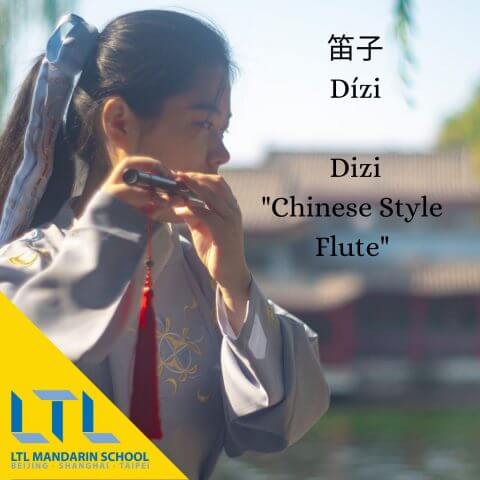
The Dizi is a kind of Chinese style flute, usually made of bamboo.
One of the holes is covered with paper to make a distinctive buzzing sound.
The Dizi a popular instrument in China as it’s a comparatively easy instrument to make and to learn.
It’s used in many genres of Chinese folk music and opera.
- Dizi in Chinese Characters: 笛子
- Pinyin: Dízi
- English Name: “Chinese Style Flute”
Chinese Musical Instruments || Pipa 琵琶
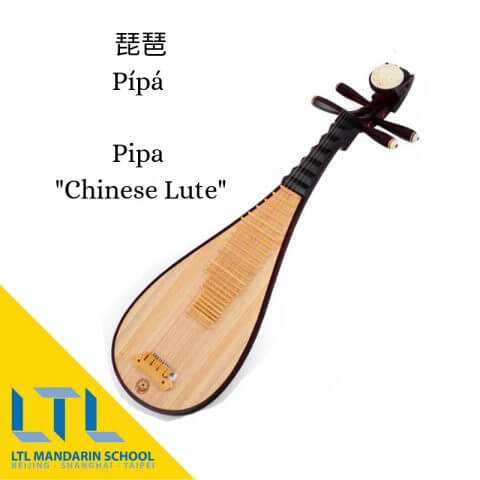
The Pipa is another traditional Chinese instrument with a long history, as it’s believed to date back around 2000 years.
Also known in English as a “Chinese Lute”, the Pipa has 4 strings and 16 frets.
The Pipa is often used to expressive and dramatic pieces of music due to it’s wide dynamic range of notes.
- Dizi in Chinese Characters: 琵琶
- Pinyin: pí pá
- English Name: “Chinese Lute”
More Musical Instruments in Chinese
One of the best ways to get your Chinese going is to learn about things you’re interested in…
So if you play a musical instrument or like music, you might find the following vocabulary section useful in conversations with your Chinese friends.
String Instruments in Chinese
Let’s take a look at some instruments you might be more familiar with.
Guitar in Chinese
- Guitar in Chinese Characters: 吉他
- Pinyin: jí tā
- Meaning: Guitar is translated to sound as close to the original as possible using Chinese syllables.
Cello in Chinese
- Cello in Chinese Characters: 大提琴
- Pinyin: dàtíqín
- Meaning: “Big Carry Instrument”. Presumably, a big instrument that you can carry.
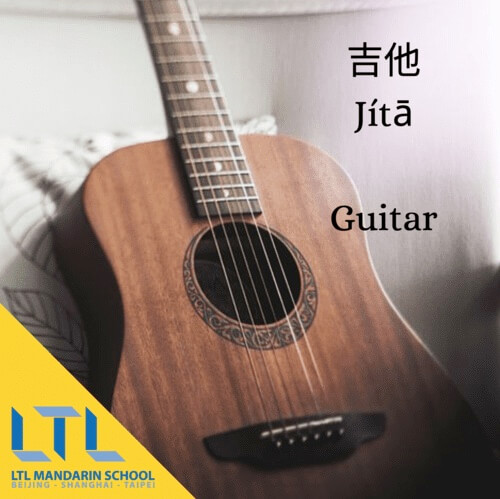
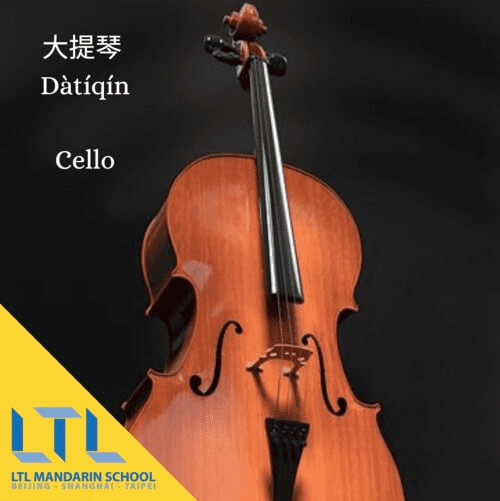
DID YOU KNOW || 提琴 on it’s own means a member of the violin/string family, you’ll see with the names of other string instruments.
Violin in Chinese
- Violin in Chinese Characters: 小提琴
- Pinyin: xiǎotíqín
- Meaning: “Little Carry Instrument”
Harp in Chinese
- Harp in Chinese Characters: 竖琴
- Pinyin: shùqín
- Meaning: “Upright Instrument”
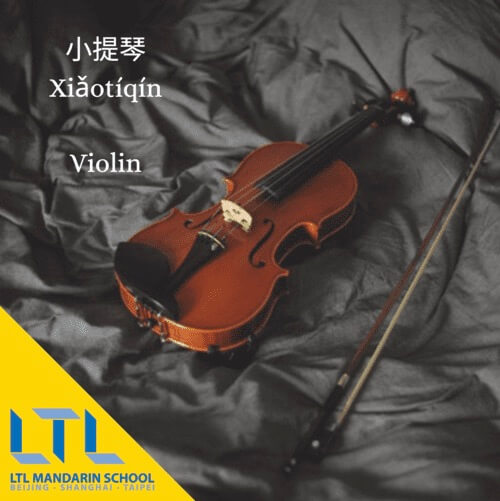
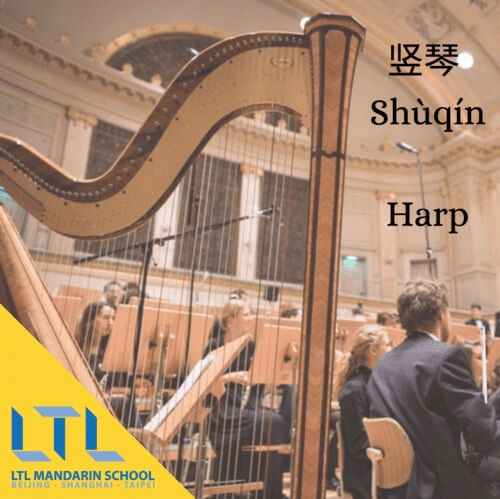
How Do You Play String Instruments in Chinese?
Chinese is a complicated language.
Did you know there is more than one word for ‘playing’ an instrument in Chinese?
In general, the verb for play will depend on the action you do in order to play the instrument.
Seeing as most string instruments are plucked that’s exactly what you would say in Chinese:
FOR EXAMPLE || 她喜欢弹吉他 Tā xǐhuān tán jítā – she likes to play the guitar.
- Character: 弹
- Pinyin: tán
- Meaning: To pluck, or play a stringed instrument
TOP TIP || A general term for playing a stringed instrument is to simply 弹琴 tánqín.
Percussion and Keys in Chinese
Piano in Chinese
- Piano in Chinese Characters: 钢琴
- Pinyin: gāngqín
- Meaning: “Steel Instrument”
Xylophone in Chinese
- Xylophone in Chinese: 木琴
- Pinyin: mùqín
- Meaning: “Wooden Instrument”
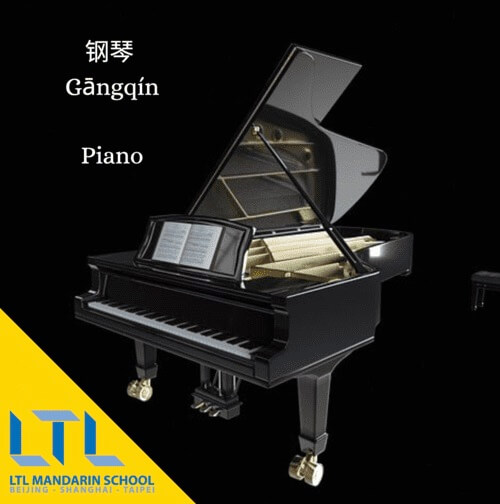
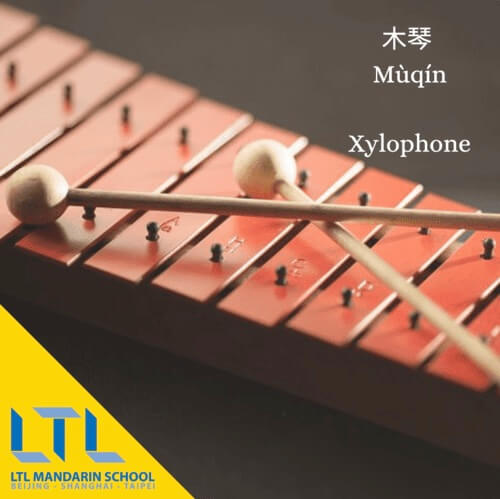
Drums in Chinese
- Drums in Chinese Characters: 鼓
- Pinyin: gǔ
- Meaning: Simply “Drum”
Tambourine in Chinese
- Tambourine in Chinese: 手鼓
- Pinyin: shǒugǔ
- Meaning: “Hand Drum”
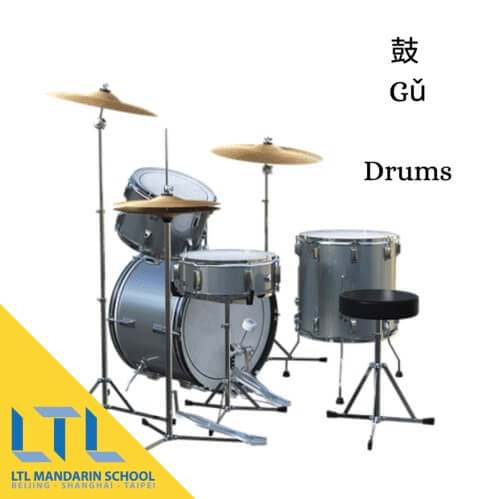
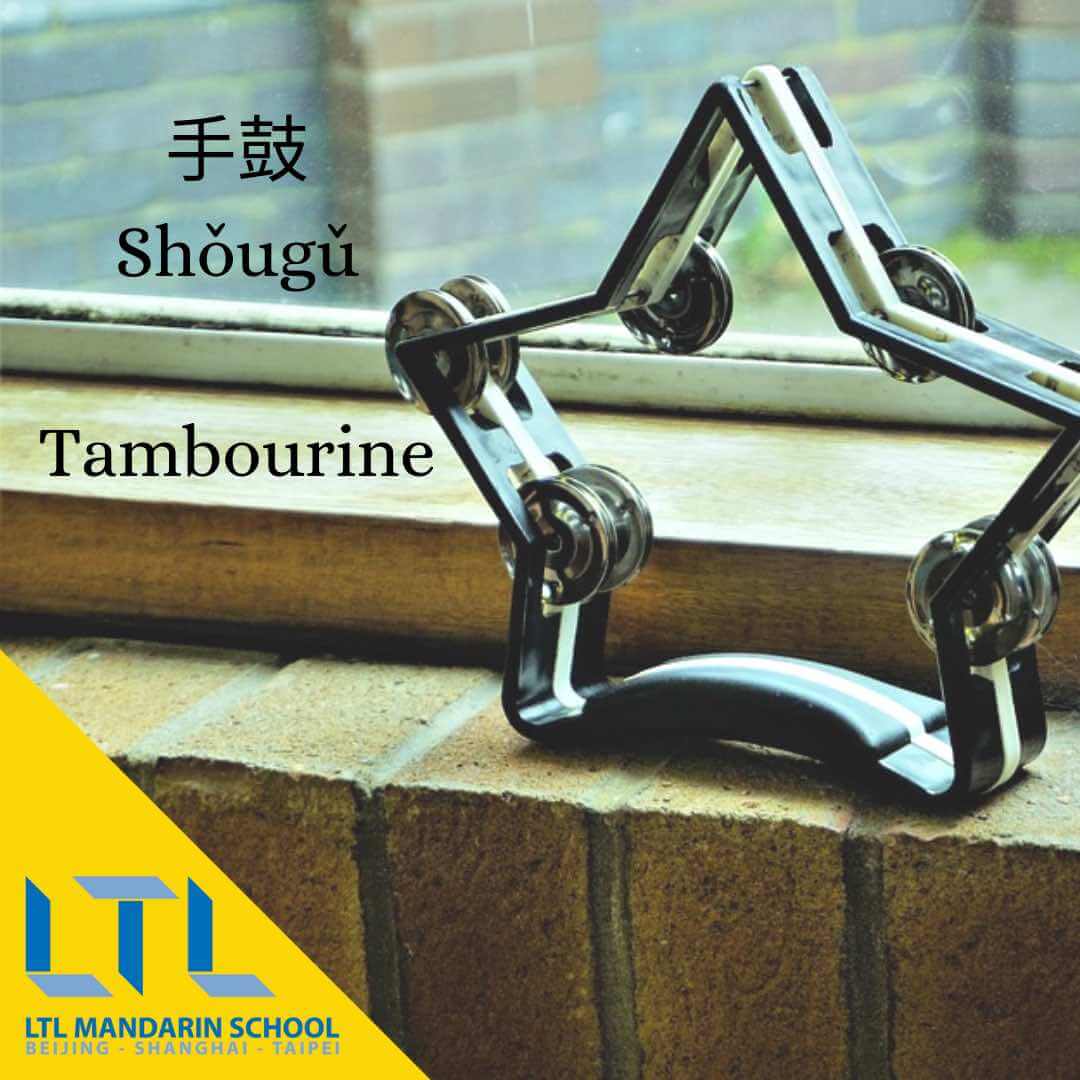
How Do You Play Keys and Percussion in Chinese?
Although 弹 means pluck, it’s also used as the word for playing the piano.
I mean technically a piano has strings, even though you don’t really pluck them.
- Character: 弹钢琴
- Pinyin: tán gāngqín
- Meaning: To play piano
The Chinese way of saying playing the Xylophone is a bit different. Again, it is based on the action used to play the instrument.
In this case, it’s taken from the word to knock/beat/strike – 敲 Qiāo. Makes sense!
- Character: 敲木琴
- Pinyin: Qiāo mùqín
- Meaning: To play the Xylophone
For the drums and tambourine, another word is used – 打 to hit/beat
- Character: 打鼓, 打手鼓
- Pinyin: Dǎgǔ, Dǎ shǒugǔ
- Meaning: Play drums, play the tambourine
Brass and Wind Instruments in Chinese
Trumpet in Chinese
- Trumpet in Chinese Characters: 喇叭
- Pinyin: lǎ bā
- Meaning: Refers to the sound a trumpet makes
Trombone in Chinese
- Trombone in Chinese: 长号
- Pinyin: cháng hào
- Meaning: “Long Brass Instrument”
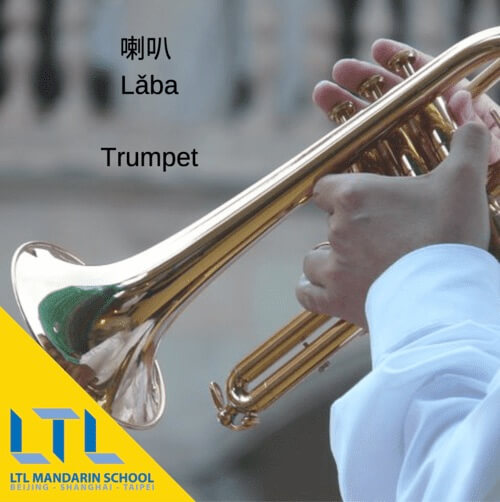
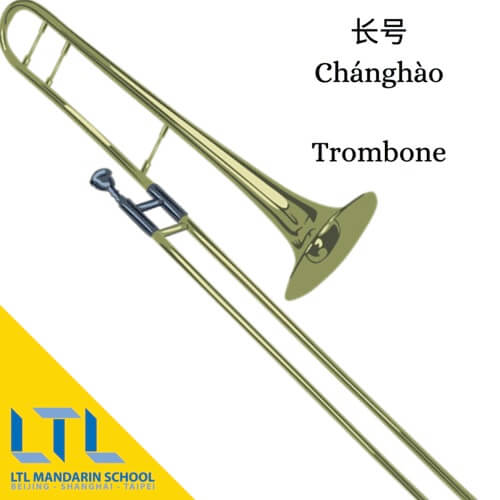
Flute in Chinese
- Flute in Chinese Characters: 长笛
- Pinyin: chángdí
- Meaning: “Long Flute”
Xylophone in Chinese
- Xylophone in Chinese: 木琴
- Pinyin: mùqín
- Meaning: “Wooden Instrument”
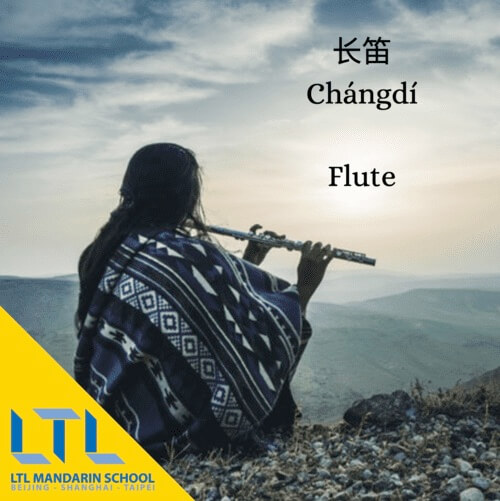
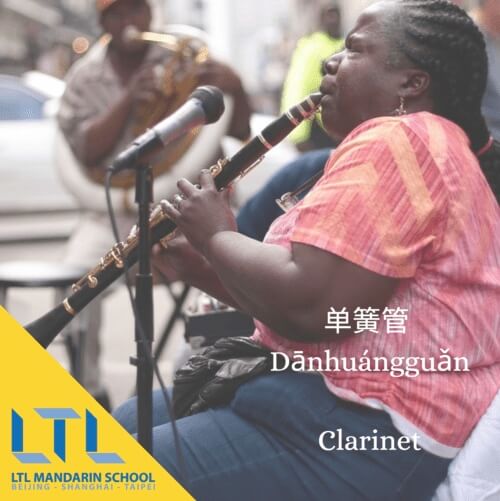
How Do You Play Brass and Wind Instruments in Chinese?
Thankfully for this set of instruments, there is only one word used to describe how to play them: 吹 meaning “blow”.
Example:
- Character: 吹长笛
- Pinyin: chuī chángdí
- Meaning: to play the flute
Of course there are plenty more instruments that we haven’t covered yet, so leave us a comment below if you’d like to know how to say an instrument that you play in Chinese.
Chinese Musical Instruments || QUIZ
Musical Instruments in Chinese || FAQs
What instruments are used in Chinese music?
The most common Chinese traditional instruments are the Er Hu 二胡, Guzheng 古筝, Guqin 古琴, Dizi 笛子 and Pipa 琵琶
What is the Chinese instrument that sounds like a violin?
Er Hu 二胡 looks and sounds much like a violin. It’s often used by street performers so you should see one in your travels of China.
What is traditional Chinese music called?
Traditional Chinese music is referred to as “zhōng guó chuán tǒng yīn yuè” (中国传统音乐)
What kind of music do Chinese listen to?
Chinese people LOVE to listen to Chinese Pop, K-Pop (Korean), Chinese love songs, original soundtracks from movies and television shows as well as trending music from around the world.
When was Chinese music invented?
The earliest musical instruments we’re seen in China in the Shang Dynasty (1800 BC) and would have been simple instruments such as drums and pipes. More traditional Chinese instruments began to emerge in the Zhou Dynasty (1000 BC).
Where can I download Chinese music?
Three great Chinese sites for listening to Chinese music online are 1ting.com, Yinyuetai.com Kugou.com. Additionally, you can find plenty of playlists of Chinese music on YouTube. Here’s one we made!
Why does Chinese music sound strange to us?
Aside from the obvious language difference between Chinese and western music most traditional Chinese music is based on the five-tone and seven-tone scale and creates quite unique sounds that affect the variations in tone, quality, beat, rhythm.
These sounds can sound strange to someone more accustomed to western-style music.
Want more from LTL?
If you wish to hear more from LTL Language School why not join our mailing list.
We give plenty of handy information on learning Chinese, useful apps to learn the language and everything going on at our LTL schools!
Sign up below and become part of our ever growing community!
BONUS | Want to study the local Taiwanese dialect known as Hokkien? We provide Hokkien classes in person and online.
⭐ Download our free ebook, your starter pack of essential Mandarin learning resources!


 Hi, my name is Greta. I am from Italy and I work as a student advisor at our Taipei school.
Hi, my name is Greta. I am from Italy and I work as a student advisor at our Taipei school. Hi, my name is Manuel! I am from Spain and I am a Student Advisor at LTL. I’m now based at our Seoul School after living 3 years in Taipei.
Hi, my name is Manuel! I am from Spain and I am a Student Advisor at LTL. I’m now based at our Seoul School after living 3 years in Taipei.

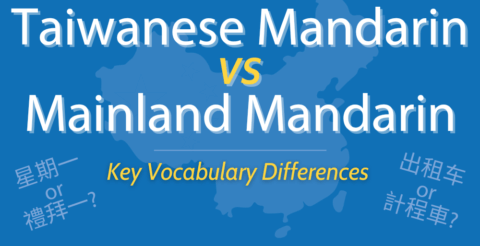



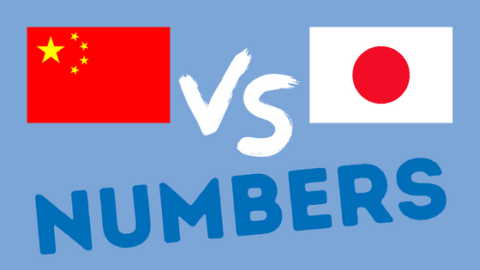

2 comments
[…] Talk about unappreciative audience. The story behind this idiom is set during the Warring States period and revolves around a musician Gongming Yi. He was an exquisite musician loved by many. One day he was out and about in town and saw some cows. He thought they might like his music and he started playing the lute (a traditional Chinese instrument). […]
[…] Scopri tutti gli strumenti in Cinese. […]